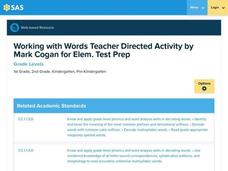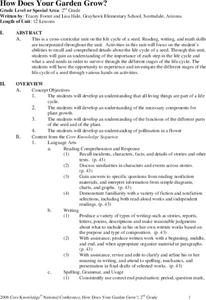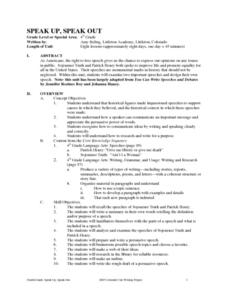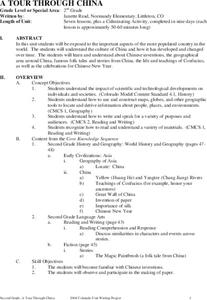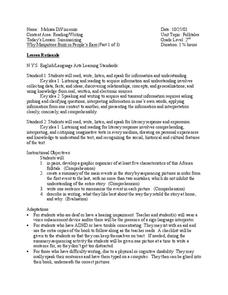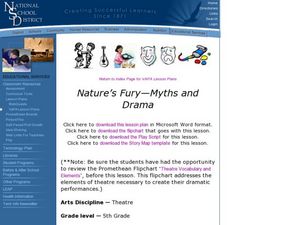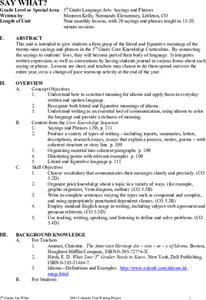Curated OER
Animal: Unique Creatures With Great Features
Pupils present models, oral reports, and presentations on animal's characteristics. They research various animals and the characteristics that link them to specific animal groups. They answer specific questions relating to animals in...
Curated OER
Life's Lessons: Survival of the Fittest
Students analyze Jack London's use of anthropomorphism to identify the importance of adaptability in life. In this literature lesson, students use the novel The Call of the Wild to identify key elements in survival. Students complete...
Curated OER
Six Trait Writing with Twain and Doyle
Students explore the traits of writing in this six lessons unit. Poems, fiction, and drama are evaluated to identify writing strategies. Utilization of vocabulary and writing rubrics help students judge the effectiveness of their own...
Curated OER
Second Graders Create Their Own Social Studies Book
Students develop their own social studies textbook. Students gain knowledge of American immigration and Ellis Island. Students discover the process of becoming a naturalized citizen and what it means to be a citizen
Curated OER
Butterfly Life Cycle
Students read books about animals and describe their structures, how they grow and change, and their life cycles. In this animals lesson plan, students also make animals out of pasta.
Curated OER
Pigs: Facts And Fun
Students complete a unit on pigs. They take a field trip to the fair and zoo, watch the video of "Charlotte's Web," create a poster, read and analyze "The Three Little Pigs," write a storybook, participate in a reader's theater, and make...
Curated OER
Charlie and the Chocolate Factory
Fourth graders research and write an author report on Roald Dahl, including books written by him, birthplace, family life, and other information on his writing. Students read aloud chapters in the book. Students create a newspaper...
Curated OER
Father Knows Best
Learners recognize that history describes events and people of other times and places identifying George Washington by historical account. They describe everyday life in the present and in the past and begin to recognize that things...
Curated OER
Trickster Tales
Students study folk tales and moral lessons from cultures around the world. In this character traits lesson, students study moral lessons through the character traits in various cultures folk tales. Students complete 11 activities...
Curated OER
Proverbs and Idioms
Students complete a unit of activities to learn about idioms and proverbs. In this idioms and proverbs lesson, students complete 16 lessons to learn about idioms and proverbs. Students complete a booklet of proverb and idiom activities.
Pennsylvania Department of Education
Working with Words Teacher Directed Activity by Mark Cogan for Elem. Test Prep
Young scholars build word families. In this interactive language arts activity, students visit a website where they play a game creating word families. Young scholars may print out their work when finished.
Curated OER
How Does Your Garden Grow?
Students complete activities to learn about the life cycle of a seed. In this plant growth lesson, students complete activities for the life cycles of seeds.
Curated OER
Speak Up, Speak Out
Fourth graders examine, compare, and summarize the speeches of Sojourner Truth and Patrick Henry. They review the parts of a good speech and design and give their own speech that expresses an opinion and persuades the listener..
Curated OER
A Tour Through China
Students explore the culture, development, inventions, and geography of China in the seven lessons of this unit. The teachings of Confucius are examined and the celebrations for the Chinese New Year are inspected.
Curated OER
World Religions: Judaism, Christianity and Islam
Students explore the three main monotheistic religions of the world: Judaism, Christianity and Islam. They compare the history, important figures, holy books, places of worship, and symbols of faith of each religion through discussion...
Curated OER
Too Many Tamales
Students investigate Mexican holiday celebrations and compare them to American Christmas holidays. They conduct a Mexican Christmas Scavenger Hunt. The instructional activity uses a streaming video in order to engage students in the main...
Curated OER
Why Mosquitoes Buzz in People's Ears
Second graders study folktales and their characteristics. After brainstorming what they know about Africa, 2nd graders read a book about mosquitoes. In groups, students develop a graphic organizer about the characteristics of the...
Curated OER
When in Rome
Students study the Roman history and culture. In this Roman history lesson, students complete seven different lessons to help them learn about Roman myths, gods and goddesses, and history.
Curated OER
Nature’s Fury—Myths and Drama
Fifth graders explore the elements of theatre. In this dramatic performances lesson, 5th graders discuss the structural elements of theatre and dramatize "The Origins of the Season," an explanation myth.
Curated OER
Rooster's Night Out
First graders complete interdisciplinary activities associated with a folktale from Cuba. In this Cuban folktale lesson, 1st graders read the Rooster's Night Out, before completing comprehension worksheets, make recipes, and...
Curated OER
Nothing To It!
First graders explore the zero property of addition and subtraction through the creation of a class book. Includes an assessment sheet.
Curated OER
Who is Picasso?
Students create art projects both representational and nonrepresentational. They examine a well known piece of art and discuss the feelings that the art evokes.
Curated OER
CSAP Preparation: Don't Wait for the "Eleventh Hour"
Fifth graders participate in language arts activities designed to prepare them for taking standardized tests. The language arts format covers science and social studies content. Handouts and worksheets are included in the lesson.
Curated OER
Say What?
Students explore the literal and figurative meanings of twenty-nine phrases and sayings. This unit of nine lessons integrates written expression and convention to demonstrate the value of idioms to the language.












